"Tourism Capital of Madhya Pradesh"
Gwalior Tourism
A historic city founded by king Surajesan, Gwalior is galore with beautiful monuments, palaces and temples, giving this city a majestic charm which speaks volumes of its glorious past.
The city's heritage has remained captured in the imposing architecture of mosques, rock temples and statues. Surrounded by beautiful hills and greenery. Being a historic city where one of India's most eminent royalty once resided, Gwalior is full of palaces and glorious temples. TheGwalior fort, which gives a panoramic view of the entire city, the Jai Vilas palace and the Sun Temple are few of the tourist spots in Gwalior that cannot be missed. The great Indian musician Tansen was born in Gwalior and the tomb of Tansen is also an important place here. Every year, in the month of November/December, a four-day Tansen Music festival is celebrated in the city and it sees various classical musicians from all over the country performing on the stage near the tomb itself. Gwalior is also the birthplace of former Indian Prime Minister Shri Atal Bihari Vajpayee, music maestro Amjad Ali Khan and the famous percussionist Alla Rakha.
Download Gwalior PDF Guide >
What's Great?
Gwalior is a city famous for valour and love for art. Gwalior has forts, temples and many other monuments that remind Hindus of their brave and proud heritage.
What's not so Great?
Gwalior is a very hot city so it can be dry and sightseeing during summers can be troublesome. Does not have much to offer apart from the historical monuments and temples.
For Whom
The place is a must visit for all those who love the Indian history. It can prove as a fun trip for families and elderly. People from states like Himachal Pradesh and Uttarakhand should visit this place for a different experience.
History
Gwalior has a history of being passed on from one dynasty to the other. In as early as 1231, Iltutmish, the third ruler of the Delhi Sultanate captured the Gwalior fort, and it remained under Muslim rule till the 13th century. In 1375, the founder of the Tomar clan, Raja Veer Singh was made the ruler. 1730 saw Gwalior come under the Scindia rule in the 17th and 18th century (Maratha Dynasty) and remained a Princely State during the British rule in the 19th and 20th century. It is also famous for being non-cooperative in the 1857 Battle of Rebellion.
The first occurrence of zero as a written number is recorded in the Chaturbhuj Temple of Gwalior. Hence, Gwalior has the dual historical importance of being ruled by different dynasties as well as being a centre of scientific and mathematical significance.
Etymology
As per local tradition, king Suraj Sen of Gurjar-Patihar was lost in the forest when he met Sage Gwalipa. He asked the Sage for water and he led the king to a pond, which not only quenched his thirst but also cured him of leprosy. The ruler expressed his desire to reward the Sage. The Sage asked him to build a wall in the forest so as to save other saints from wild animals during yagnas. He later built a palace in the fort and named it Gwalior, after Sage Gwalipa. The city that grew around this fort came to be known by the same name.
Culture of Gwalior
Gwalior has had a history of bearing rich culture and holds a very important position in the history Indian classical music. It is the birthplace of the oldest genre of Hindustani Sangeet- Gwalior Gharana. The Gwalior Gharana is not only the eldest Khayal Gharana but also one of the most prominent Gharana of Indian classical music to which most musicians can trace their origins. The origin of Ghariyal Gharana began during the reign of the great Mughal Emperor Akabat during 1542-1605. Legendary maestro Tansen in the court of Akbar was the most prominent patron of this Gharana, belonging to Gwalior.
Culturally, Gwalior is the confluence of two culturally rich territories- Braj and Bundeli.
Many prominent figures from the field of poetry, music and arts belong to Gwalior. Three generations of the Akhtar family, Mustar Khairabadi, his son Jan Nisar Akhtar and grandson Javed Akhtar have their origin here. Well known Urdu and Hindi poet Nida Faizal grew up in Gwalior. The great sarod player, Amjad Khan, belongs to Gwalior and his grandfather, Ghulam Ali Khan Bangash became the court musician of Gwalior.
Tansen Music Festival
The Tansen Samaroh, which started as a local music festival was turned into an event of national importance(between 1952-1962) with the efforts of the then I&B Minister B V Keskar. Held in December every year near the tomb of Tansen at the Behat village of Gwalior, this renowned music festival is a 4-day extravagant tribute to the great musician Tansen. Vocalists, musicians and music lovers gather for this famous festival to celebrate Indian music and musicians.The Tansen Samaroh is held by the Department of the Academy of the Culture, Government of Madhya Pradesh.
A very significant event of this festival is the prestigious National award called ?Tansen Sammaan', bestowed upon the exponents of Hindustani music.
Itinerary
Day 1 -Start your trip by visiting the Gwalior Fort. It would take you around 2-3 hours to explore the beauty of the fort. Next, head to the Sun Temple. You can also enjoy the local cuisine of Gwalior which is very amazing.Day 2-Visit the Jai Vilas Palace Museum. After spending a few hours here, you can head off to the Tansen's Tigra Dam for a lovely evening.
Restaurants and Local Food in Gwalior
Gwalior's cuisine like its architecture, heritage and culture is rich and colorful. Gwalior is famous for its vegetarian food and one finds numerous options here. This area is known for its elaborate breakfast consisting ofkachoris, Samosas, Poha and bedaiAmong the local Madhya Pradesh cuisine, do try the kebabs, bhutte ki kees, Dal Bafla, Jalebi, Imarti, Rogan josh, mawa-bati and Malpua as well as traditional sweets such as theMorena Gajak. Other than the traditional delicacies one also finds a number of fast food joints, quickly becoming a rather popular part of the city's platter.
View 9 Restaurants in Gwalior >>
Jul-Maris the best time to visit Gwalior
October to March is the best time to visit Gwalior. However, those who don't mind little rains can also visit between July and September. The four-day Tansen Music Festival (Nov/Dec) is also a good time to visit Gwalior if you are interested in enjoying the Indian classical music performances.
Weather in Gwalior
Loading...
Gwalior in Summer (March - June)
Gwalior experiences scorching hot summers with the temperature going up to 48 degrees Celcius. It is not a good time to visit the place as the high-temperature makes it difficult to go for sightseeing during the day.
Gwalior in Monsoon (July - September)
Monsoons in Gwalior bring relief from the extreme heat of the summer. Though it is a welcome change from the hot days, the rainfall increases the humidity of the place to a great extent. The temperature ranges between 25 and 32 degrees Celcius. The nights are cooler during the monsoon.
Gwalior in Winter (October - February)
The winters in Gwalior is very chilling with the temperatures going below subzero level. The highest temperature ranges around 25 degrees Celcius. This is the perfect time to explore the beauty of its many monuments.
Monthly Weather in Gwalior
Month
Avg. Minimum (°C)
Avg. Maximum (°C)
January
9
23
February
11
27
March
16
33
April
23
41
May
27
42
June
28
41
July
27
34
August
26
32
September
25
34
October
20
34
November
13
30
December
10
26
Events in Gwalior
Tansen Music Festival
21st - 26th January
The Tansen Music Festival, is a unique four-five day festival, dedicated to pillar of Indian music, the great Tansen, and it is held at his tomb in Gwalior every year. Celebrated musicians come together and perform for sessions that go on all night.
Gwalior Trade Fair
16th December -17th Jan
A unique blend of art and business the Gwalior Trade Fair has behind it a history of a 110 years. Spread over a 104 acres, the items sold range from clothes, electric appliances, pottery to cattle.
Comments on Gwalior
Post Your Comment
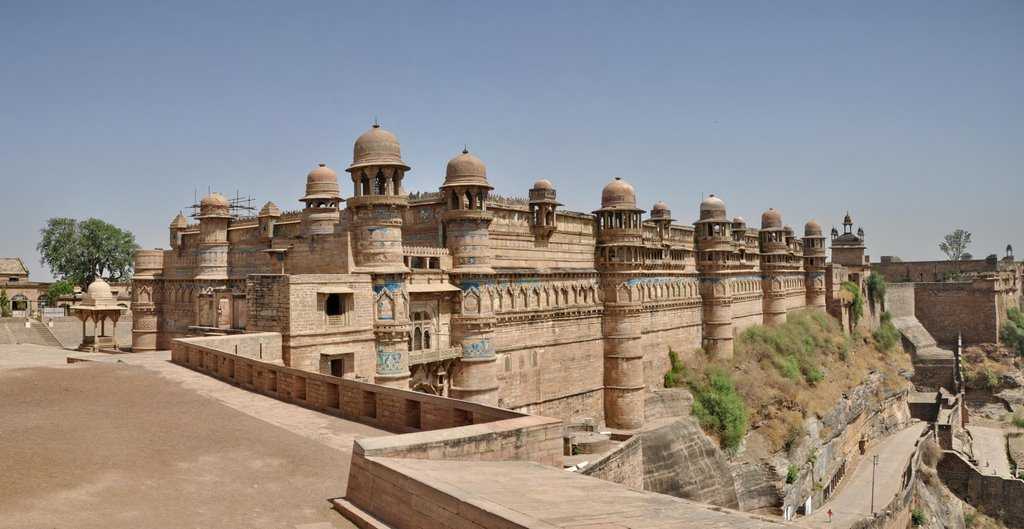

 Gwalior fort
Gwalior fort Jai Vilas Palace
Jai Vilas Palace Man Mandir Palace
Man Mandir Palace Gujari Mahal (State Archaeological Museum)
Gujari Mahal (State Archaeological Museum)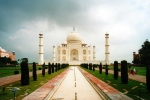 Agra
Agra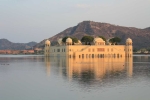 Jaipur
Jaipur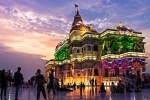 Mathura
Mathura Orchha
Orchha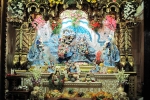 Vrindavan
Vrindavan